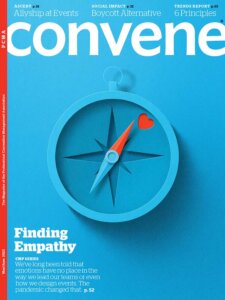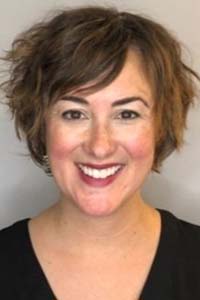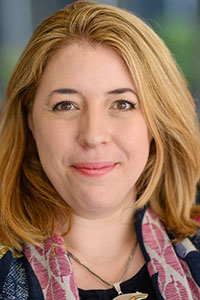One definition of empathy, said Naomi Clare Crellin during a session at PCMA EduCon 2022, is “letting go of what you think you know.” But since event organizers often pride themselves on how well they know their audiences, added Crellin, who founded event design company Storycraft Lab, “asking questions that we already think we know the answers to is not always an easy first step to make. From the organizer’s perspective, it requires quite a bit of bravery.”

This story is part of our May/June cover and CMP Series story package. Find the print facsimile edition here.
Such boldness has rewards. Crellin was joined in the session by Alisha Wenc, the former head of programming at the women’s leadership organization C200, where the pair talked about the transformative effect of inviting members to participate in the event-planning process. At C200, Wenc, now associate program director at the Center for Cyber Safety and Education, worked with Storycraft Lab — in the form of focus groups and workshops — to redesign an annual in-person meeting into an online event.
The C200 audience was equally divided between those primarily interested in content and those more interested in networking, Wenc said, and the process yielded insights for both. For the connectors, “we looked at a lot of the space around the content,” adding elements like “walk and talks,” encouraging participants to pick up their phones and call someone new, and virtual lounges for post-session debriefs. The strategy of creating a framework for connection around content also translates well to in-person events, Wenc said.
Based on member feedback, C200 designed content sessions that gave participants a voice, Wenc said. C200’s executive members like being active participants, rather than passive observers, Carolyn Dolezal, the organization’s former CEO, told Convene: “Whether it was a business problem and a fishbowl or a debate, they love being actors in the discussion — not merely the audience.”

Alisha Wenc
One particularly successful session was about aging, Wenc said. “Not only physically aging, but what happens when you become an empty nester or when your parents potentially need additional assistance. What does it mean to go from a high-powered career to being a retiree? Having those open and honest discussions was really valuable for the people, especially those who wanted to connect.”

Naomi Clare Crellin
Using the focus groups “really changed the dynamic of the whole event in ways that I hadn’t expected it to, but I think led to such a better end product,” Wenc said. “And it didn’t require an additional huge amount of time to integrate that empathetic dialogue into the process of development.” Two bonuses: It helped organizers understand which members are interested in what topics and who might make great session leaders, she said. “And it also helped us find those volunteers who then became further ambassadors, not only for the sessions they may be leading, but for the event as a whole.”
One lesson learned was around language, Wenc said. When she first talked to leadership about empathy and engagement, she spoke in terms of providing “safe spaces” for discussions, which did not resonate, she said. C200 is an educational organization in the business of providing rigorous educational opportunities to members, she said. “Something called ‘safe spaces’ didn’t seem to fit into that.” She changed the wording. “What we were really doing was creating educational opportunities for best-practice discussion and hot topics. And when I reframed it and rephrased it, I was able to get the buy-in.”
ON THE WEB
PCMA members can watch the EduCon 2022 session, “Empathy and Engagement in Process, Practice and Program.”
Barbara Palmer is deputy editor at Convene.

